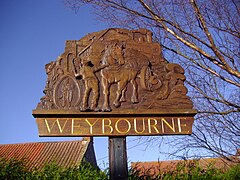Weybourne, Norfolk
| Weybourne | |
|---|---|
 The village sign |
|
| Weybourne shown within Norfolk | |
| Area | 6.91 km2 (2.67 sq mi) |
| Population | 543 (2011 census) |
| • Density | 79/km2 (200/sq mi) |
| OS grid reference | TG1143 |
| • London | 131 miles (211 km) |
| Civil parish |
|
| District | |
| Shire county | |
| Region | |
| Country | England |
| Sovereign state | United Kingdom |
| Post town | HOLT |
| Postcode district | NR25 |
| Dialling code | 01263 |
| Police | Norfolk |
| Fire | Norfolk |
| Ambulance | East of England |
| EU Parliament | East of England |
| UK Parliament | |
Weybourne is a village on the coast of North Norfolk, (UK), and has the postcode prefix of NR25. The village is surrounded by arable fields, woodland, and heathland and straddles the A149 coast road three miles west of Sheringham, within the Norfolk Coast AONB. The area is popular for the local countryside and coast and in particular for walking, wildlife, and bird-watching.
Changes in government policy have led to the discontinuation of management of coastal erosion in North Norfolk.
Weybourne is mentioned in the Domesday Book where it is called Wabrume. The remains of an old Augustinian priory founded around 1200 AD by Sir Ralph de Meyngaren (Mainwearing) stand on the site of a simpler Saxon church. By 1494 only one prior and three canons lived there: one canon complained that the priory was so poor it was unable to pay him his 20 shillings of annual pocket money. At a visitation in 1514 there was only one prior and one canon and this situation remained until King Henry VIII ordered the dissolution of monasteries and priories.
Weybourne has long been considered a possible site for invasion, one reason being the deep water offshore. "He who would all England win, should at Weybourne Hope begin." During the Second World War defences were constructed around Weybourne as a part of British anti-invasion preparations of World War II. The beaches were blocked by landmines and extensive scaffolding barriers; further inland there were pillboxes, barbed wire entanglements, a long anti-tank ditch and other defences.
...
Wikipedia

